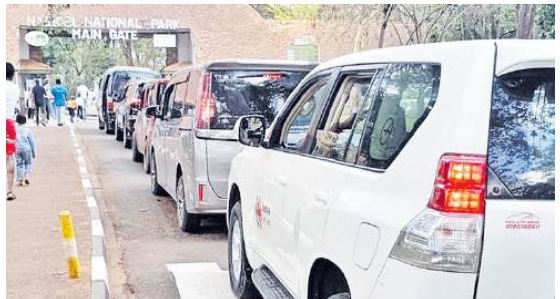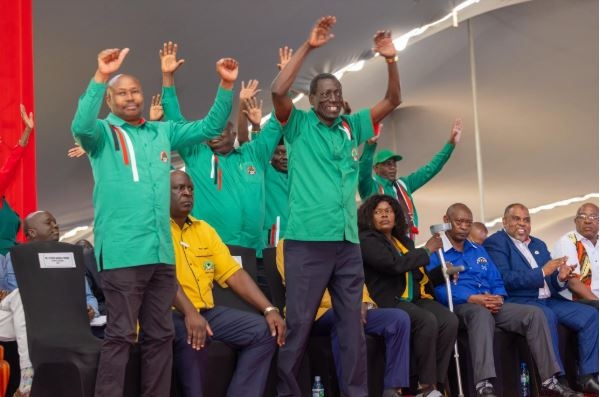
 Nairobi National Park main entrance /HANDOUT
Nairobi National Park main entrance /HANDOUT
Introduction of new entry fees into national parks, reserves and sanctuaries by Kenya Wildlife Service has been dealt a blow after the High Court temporarily stopped it.
This is after the Kenya Tourist Federation (KTF) moved to court to challenge the decision to implement the new rates with a 48-hour notice, amid industry concerns that the move will affect bookings and expose players to cancellations, disputes and reputational damage for both the tourism operators and Kenya's tourism brand at large.
While KTF does not oppose the new charges, which it was involved during the public participation and discussions with KWS, alongside Kenya Association of Tour Operators (KATO) and the Kenya Association of Hotelkeepers and Caterers, the bone of contention is the timelines which the hiked fees have been implemented.
In a letter to KWS director general Erastus Kanga, seen by the Star, KTF had earlier said the new fees, which were to take effect yesterday (October 1), were implemented within a short notice of two days , through a notice issued by KWS on September 29, a period which was too short.
“This sudden implementation comes despite industry requests during the recent public participation for a start date of 1st January, 2026,” KTF chairman Fred Odek had said.
“Whereas many stakeholders are clear that they had no issue with the quantum of the increase, there were major concerns about the implementation date. The recent announcement gives just two days' notice, which creates untold problems for tour and other operators.”
According to the federation, the tourism sector operates on a cycle of long-term planning and many members of KTF have already secured bookings with clients up to December 2025, based on the prevailing conservation fees.
KTF argues that the immediate implementation of the new charges is not feasible as it will directly affect tour operators' ability to honour existing agreements and meet the expectations of their clients.
The timelines, it says, leaves no room for tour operators to adjust their packages or renegotiate pricing with clients, nor does it allow for any meaningful communication with international and domestic customers, many of whom have already made substantial financial commitments to their travel plans.
“This will definitely lead to cancellations, disputes and reputational damage,” Odek said in his letter.
Tour operators who have already confirmed pricing structures up to December 2025 will be forced to either absorb the additional cost or risk losing clients who are unable or unwilling to accommodate the sudden increase, if the decision stands.
The existing Consumer Laws governing sale of holiday packages in the EU do not allow price changes after a package has been confirmed and paid for, meaning the move will leave Kenya operators severely exposed either to litigation or financial losses.
KTF wants Kenya Wildlife Service to postpone implementation of the new conservation fees to January 1, 2026 as originally recommended by industry stakeholders.
This extended timeframe, it says, will provide all stakeholders the necessary time to adjust and communicate effectively with clients, ensuring that Kenya's tourism sector continues to thrive while meeting the important goals of conservation.
In an order seen by the Star, Justice John Chigiti (Milimani High Court) yesterday allowed the application by KTF, meaning until the matter is heard and determined, the new rates are in abeyance.
A substantive application is to be filed and served within seven days with the respondents also required to file and serve their response within seven days from the date of being served.
“The Respondents shall file and serve their submissions within seven days of service of the applicant's submissions,” the court order reads in part, with the matter set for mention on November 11.
The new fee schedule classifies charges by visitor categories: East African citizens, Kenyan residents, non-residents (international tourists), and African citizens from other countries. Prices vary depending on the park.
Amboseli and Lake Nakuru National Parks are to charge Sh1,500 for East African citizens, Sh2,025 for residents, $90 for non-residents, and $50 for African citizens.
Access to Nairobi National Park would cost Sh1,000 for East African citizens, Sh1,350 for residents, $80 for non-residents, and $40 for African citizens.
The Tsavo East and Tsavo West packages have been set at Sh3,000 for East African citizens, Sh4,000 for residents, $215 for non-residents, and $ 115 for African citizens. All parks, including marine and heritage sites have also had their charges adjusted.
Industry players have urged that the move, while intended to support conservancy and support KWS operations, Kenya risk losing out to competition.
Kenya (2024 non-resident daily entry) for Maasai Mara was $200 (July–December), $100 (January–June); Amboseli and Lake Nakuru $80; Nairobi National Park $100.
Tanzania’s Serengeti, Ngorongoro charges $70–$80, South Africa’s Kruger National Park is $25–$30, Botswana’s Chobe charges $20–$25 while Namibia’s Etosha charges $10–$15.
















